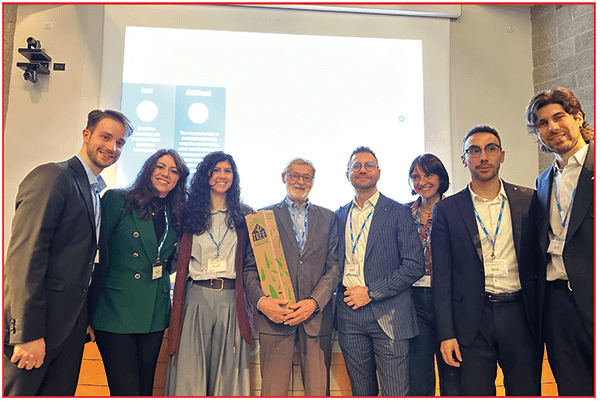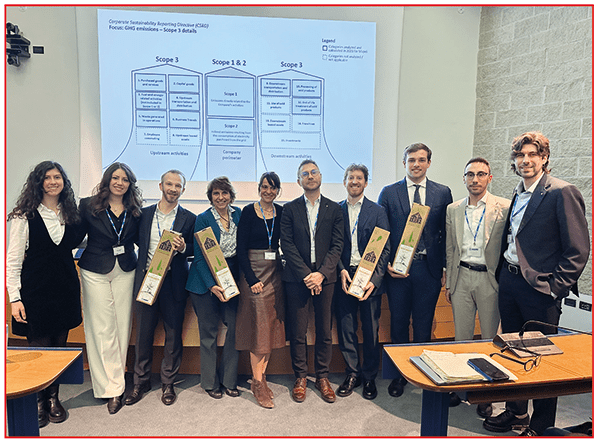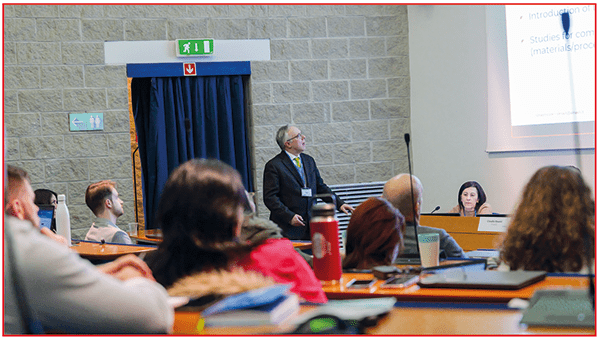the importante of sustainability for mapei
Fabio Psoroulas
MAPEI

Recently, Mapei organized its first International Sustainability Meeting focused on sustainability. The headquarters in Milan hosted, from February 11th to 13th, managers from the company and affiliated entities from various countries, whose work is dedicated to analyzing and reducing the environmental impact of the company’s products, activities, and structures on the environment.
MAPEI’S COMMITTMENT SINCE 2015
It was in 2015 when Mapei decided to dedicate a specific function to sustainability, and since then, the company has made significant progress, as demonstrated by the presentations of the speakers at this important event. There were many key topics that industry professionals face every day: LCA (Life Cycle Assessment), EPD (Environmental Product Declaration), VOC (Volatile Organic Compounds) emissions, LEED, CPR, and carbon credits.
The Italian chemical company dedicates a substantial portion of its investments in Research & Development and an increasing share of human resources to reducing its environmental impact by approaching sustainability from many angles and in various fields.
A concrete, effective, and accurate approach, in line with European regulations, such as the Green Claims Directive proposed in 2023 by the European Commission with the aim of protecting consumers from greenwashing and enabling them to make informed choices by establishing reliable, comparable, and verifiable sustainability parameters.

THE “ZERO” PROJECT AND THE LAUNCH OF A NEW ADHESIVE
The meeting opened with a speech by Marco Squinzi, CEO of Mapei, who, in addition to reaffirming the Group’s long-standing commitment to sustainability, emphasized that those dedicated to this field must not only have the necessary expertise but also be able to effectively communicate the company’s activities and results in this area, backed by numbers and sources. This commitment to serious and reliable communication is something the company deeply cares about and is increasingly important today to maintain its reputation as a reliable and trustworthy supplier in an increasingly demanding market.
Roberto Leoni, Mapei’s first Sustainability Manager, explained the initial steps in creating a specific function dedicated to sustainability, within Mapei’s organizational structure. Following the growing interest in LCA and EPD in the construction market, Leoni focused on environmental impact assessments, collaborating with research institutions and industry associations, and, in 2015, launched the first “Zero*” product — the introduction of Keraflex Maxi S1 Zero (a high-performance grey and white cementitious adhesive with zero vertical slip, extended open time, deformable, Low Dust technology, specially designed for large-format ceramic and stone tiles, with extremely low volatile organic compound emissions and greenhouse gas emissions offset), the first product with dell’ottenifully compensated residual CO2 emissions through specific environmental protection projects.
The “Zero” project, as explained by Mikaela Decio, Corporate Environmental Sustainability Manager of the Group, has grown over the years, involving many countries across all five continents and more than 230 products across 5 product lines. In 2024, this initiative allowed the Mapei Group to offset 300,000 tons of CO2 globally. The project includes all necessary measures (primarily the formulation of quality, durable, low-environmental-impact materials) to reduce greenhouse gas emissions throughout the product’s lifecycle and offset unavoidable emissions through the purchase of certified carbon credits supporting forest protection projects.
Similarly, another indicator of Mapei’s commitment to sustainability has grown: the number of EPDs, or Environmental Product Declarations, which since the first one in 2016 have now exceeded 330. These certifications, prepared according to international standards, provide transparent, comparable, and reliable information on the environmental impact of a product, calculated using the LCA method, which considers the entire lifecycle of a product (extraction and transport of raw materials, production process, product transportation and application, and end-of-life disposal).

ENVIRONMENTAL IMPACT ASSESSMENT
Another area where Mapei’s commitment to the environment has become a consolidated practice is the measurement and certification of the impact of its products on the air quality. For several decades, the company has dedicated part of its Research & Development activities to formulating materials with low emissions of volatile organic compounds (VOCs), certified with labels such as Emicode and Blauer Engel.
All these aspects are crucial factors for obtaining sustainability certifications for the building structures: the most important of which is LEED (Leadership in Energy and Environmental Design), a voluntary point-based system with various levels of certification developed in the United States by the US Green Building Council and used globally.
The importance of sustainability and the assessment of environmental impacts on construction products is further confirmed by the introduction of these parameters in the new version of the Construction Product Regulation (CPR), which will apply to all CE-marked products, as explained by the Corporate Quality function.
NOTES
* The CO2 emissions measured throughout the lifecycle of products in the Zero line for the year 2025 using the LCA methodology, verified and certified with EPDs, are offset through the purchase of certified carbon credits to support forest protection projects. A commitment to the planet, people, and biodiversity.
